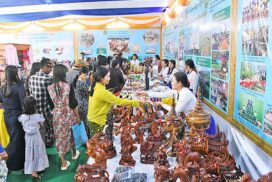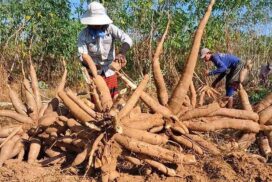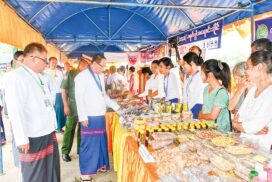In pursuit of its economic policies, the government has embraced three key objectives: to enhance agriculture and livestock production with modern technologies, to invigorate Micro-, Small- and Medium-Sized Enterprises (MSMEs) for elevating the export sector, leveraging the momentum for sustained economic growth, and to spur the cultivation of oil crops to meet targeted production levels, thereby achieving domestic self-sufficiency in edible oil while striving towards the export of surplus oil. The cornerstone of this effort lies in the early-stage small- and medium-scale enterprises that underpin MSME businesses.
Diverse MSME Categories
Government intervention in various sectors of economies worldwide is a common phenomenon, varying based on each country’s unique circumstances. MSMEs manifest in four primary categories: productivity, trading, services, and others. Among these, manufacturing businesses serve as the practical foundation, as trading and service enterprises depend on manufacturing for operation. Myanmar passed the SME law rooted in MSMEs in 2015, adopting policies and regulations to facilitate effective task execution and business operation.
Myanmar’s ample raw materials enable prioritization of desired products, yet investments and technology infusion are needed for chemical and similar production. With more than 40,000 MSMEs within the country, achieving success demands market access and provision of services through trade. This underscores the significance of collaborating with the international community and ensuring a seamless flow of information and commodities.
Supporting MSME Growth
The relevant ministry must facilitate adequate electricity supply to MSME industries in respective regions, employing small-scale power generation to avoid straining the national grid. Additionally, cultivating technicians and skilled workers across different levels is crucial for the advancement of MSMEs. Initiatives like vocational courses conducted by the Labour Ministry and the Small-scale Industries Department under the Ministry of Cooperatives and Rural Development should effectively equip youths in relevant regions and states to secure livelihoods through gainful employment.
Central to this endeavour is the acquisition of human resources. Standardization of domestic MSME products and adherence to international quality standards for export products are imperative. Scaling up manufacturing contributes significantly to the national economy, with emphasis on agriculturally-based, livestock-related, and natural resource-driven production.
Key Aspects of SME Business
Salient features of SME businesses centre on the 2015 SME Development Law, providing businesspersons with guidelines for entity establishment and liabilities. A comprehensive understanding of this law empowers entrepreneurs to navigate business operations successfully.
Defining Small and Medium Enterprises
The Small Enterprise encompasses the following categories: manufacturing enterprises with fewer than 50 permanent employees or a capital investment not exceeding K500 million; labour-intensive or piecework enterprises with under 300 permanent employees or a capital investment within K500 million; wholesale enterprises with under 30 employees or the previous year’s annual income not exceeding K100 million; retail businesses with less than 30 employees or annual income not surpassing K50 million; service enterprises with under 30 employees or previous year’s annual income below K100 million.
Similarly, the Medium Enterprise includes manufacturing operations with fewer than 300 permanent employees or a capital investment between K500 million and K1,000 million; labour-intensive or piecework businesses with fewer than 600 permanent employees or a capital investment ranging from K500 million to K1,000 million; wholesale enterprises with fewer than 60 employees or previous year’s annual income between K100 million and K300 million; retail businesses with under 60 employees or annual income within K50 million to K100 million; service enterprises with fewer than 100 employees or previous year’s annual income ranging from K100 million to K200 million.
Driving Economic Imperatives
Sustainable socioeconomic development hinges on robust economic, political, and defence drives in any nation. A strong economic drive positively impacts political and defence agendas. Myanmar’s core economic driver is its agri-based sector, particularly agriculture and livestock. Thus, promoting MSMEs anchored in these domains to produce value-added products becomes crucial for generating state revenue.
Presently, MSME processes have evolved from SMEs due to their pivotal role in national development. These enterprises can reduce import volumes and foreign exchange outflows by domestically manufacturing essential products, thereby contributing to the overall economic growth of the nation.
Illustrative MSME Ventures
Entrepreneurs invest resources in micro-, small-, and medium-sized enterprises across the nation. More than 40,000 MSMEs are operating their businesses, most of which manufacture products for domestic consumption. So, these products cannot compete with imported goods due to a lack of standardized quality, packaging process and advertisement techniques. As such, the majority of Myanmar’s MSME industries need to expedite their efforts for the production of quality goods for the purpose of domestic consumption with a plan to export the surplus ones. Whatever it may be, running these MSMEs will be an initiative for handling the heavy industries on which the State can rely by creating job opportunities for local people and relevant technicians. As such, they have to march towards the goal of the industrial sector, from their startup of the manageable scale industries. For instance, Ywathit Kaingtar village in Bago Township operates 18 iron melting industries, producing ironware for domestic use, raw metals, and export products. Similarly, Thabyu Smart Village in Kawa Township manufactures auto parts, electronic machinery, vessel fans, sewing machines, and personal goods. These small-scale industries follow the 4R principles namely ‘reduce’, ‘reuse’, ‘recycle’, and ‘recover’ in their production processes.
In terms of industrial techniques, many Myanmar foundries rely on conventional processes using coarse sand moulds, resulting in lower product quality. Collaboration between relevant departments and local businesses involves training in modern iron casting techniques, leading to improved product quality. This also creates opportunities for local youths to access advanced technologies and employment prospects.
Foreign Assistance and Institutional Support
International organizations contribute significantly to Myanmar’s MSME sector. Denmark’s commitment of K2 billion and the Responsible Business Fund’s support through calls for proposals address challenges such as power supply, energy costs, and production drops. Over the past five years, Denmark has provided K19.576 billion to 609 MSMEs across regions. Likewise, the European Union’s ARISE Plus programme aids sustainable trade and global opportunities for SMEs.
Following the instruction of the Central Committee for Development of Micro, Small and Medium Enterprises, the MSME Development Agencies have been established in various regions and states, contributing to a conducive environment for MSME growth. Currently, the government disburses loans to MSME businesses from the State economic promotion fund whereas the Myanmar Agricultural Development Bank issues loans to farmers through the JICA two-step loan.
Optimal Timing for Collective Progress
The present juncture is opportune for reopening closed industries and enhancing existing ones to accelerate production capacity. Private industries, if nurtured, can swiftly flourish and help transition the nation into an industrialized powerhouse through collaborative efforts and the innovative spirit of young industrialists. Fostering diverse technician levels within technical institutes and technological universities is essential. Passing down techniques to the younger generation ensures the nation benefits from the expertise of technicians, industrialists, and entrepreneurs.
The path forward beckons for Myanmar to seize the moment, revitalizing industries and capitalizing on youthful creativity to drive transformative industrial growth.














